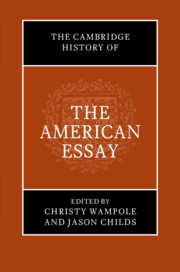Book contents
- The Cambridge History of the American Essay
- The Cambridge History of the American Essay
- Copyright page
- Contents
- Acknowledgments
- Notes on Contributors
- Introduction
- Part I The Emergence of the American Essay (1710–1865)
- Part II Voicing the American Experiment (1865–1945)
- 9 Writing Freedom before and after Emancipation
- 10 Social Justice and the American Essay
- 11 “Zones of Contention” in the Genteel Essay
- 12 The American Comic Essay
- 13 Nineteenth-Century American Travel Essays: Aesthetics, Modernity, and National Identity
- 14 American Pragmatism: An Essayistic Conception of Truth
- 15 The Essay in the Harlem Renaissance
- 16 The Southern Agrarians and the New Criticism
- 17 Subjective and Objective: Newspaper Columns
- 18 The Experience of Art: The Essay in Visual Culture
- 19 The Essay in American Music
- Part III Postwar Essays and Essayism (1945–2000)
- Part IV Toward the Contemporary American Essay (2000–2020)
- Recommendations for Further Reading
- Index
10 - Social Justice and the American Essay
from Part II - Voicing the American Experiment (1865–1945)
Published online by Cambridge University Press: 28 March 2024
- The Cambridge History of the American Essay
- The Cambridge History of the American Essay
- Copyright page
- Contents
- Acknowledgments
- Notes on Contributors
- Introduction
- Part I The Emergence of the American Essay (1710–1865)
- Part II Voicing the American Experiment (1865–1945)
- 9 Writing Freedom before and after Emancipation
- 10 Social Justice and the American Essay
- 11 “Zones of Contention” in the Genteel Essay
- 12 The American Comic Essay
- 13 Nineteenth-Century American Travel Essays: Aesthetics, Modernity, and National Identity
- 14 American Pragmatism: An Essayistic Conception of Truth
- 15 The Essay in the Harlem Renaissance
- 16 The Southern Agrarians and the New Criticism
- 17 Subjective and Objective: Newspaper Columns
- 18 The Experience of Art: The Essay in Visual Culture
- 19 The Essay in American Music
- Part III Postwar Essays and Essayism (1945–2000)
- Part IV Toward the Contemporary American Essay (2000–2020)
- Recommendations for Further Reading
- Index
Summary
This chapter begins with the origins of "social justice," a term that emerged among Jesuits in the 1840s and ’50s and then infused the Catholic workers’ movements and social teaching of the late nineteenth and early twentieth centuries. American essayists and activists have used the essay to persuade readers of the productive overlap of two utopian systems: Christianity and (democratic) socialism. This chapter explores five thinkers – Eugene V. Debs, Helen Keller, Peter Maurin, Dorothy Day, and Cornel West – who have been particularly prolific essayists, writing fluently and frequently about social justice in the earliest sense of the word. By recalling the earliest context of the term social justice, this chapter adds another dimension to contemporary debates on everything from Black struggle to economic inequality, from climate justice to equitable representation at all levels of government. The essay form allowed the writers studied in this chapter to articulate in a variety of styles, from the lyrical to the vociferous, the pedagogical to the morally urgent, the need for a compassionate understanding of human wretchedness in an industrialized world bent on breaking the worker.
Keywords
- Type
- Chapter
- Information
- The Cambridge History of the American Essay , pp. 166 - 181Publisher: Cambridge University PressPrint publication year: 2023

